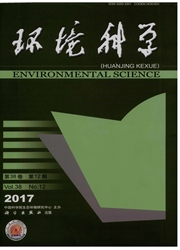

 中文摘要:
中文摘要:
采用聚碳酸酯膜直接固定法制备并优化了大肠杆菌(E.coli Top10)CellSense生物传感器微生物电极,探讨了其在重金属和有机污染物生物急性毒性分析中的应用性能.结果表明,基于对数生长后期和稳定期E.coli微生物电极的CellSense生物传感器具有良好的毒性分析性能,基于衰减期E.coli菌株的CellSense生物传感器毒性分析的稳定性和灵敏性降低;CellSense生物传感器测试得Hg^2+、Cu^2+、Zn^2+、邻氯苯酚和对硝基苯酚对E.coli的EC50分别为0.6、3.1、5.81、80和94μg/mL,制备的E.coli微生物电极在冰箱中4℃保存2个月,仍能很好地满足毒性分析的需要.
 英文摘要:
英文摘要:
E. coli microbial electrodes for CellSense biosensor were prepared by polycarbonate membrane immobilization process, and their performance for heavy metals and toxic organic compounds acute toxicity determination were studied. The results showed that when E. coli was in logarithmic and stationary phase, the CellSense biosensor with E. coli showed good performance in heavy metal ions and organic pollutants acute toxicity analysis, when E. coli was in its decline phase, the stability and sensitivity of the CellSense biosensor was poor. The EC50 values of Hg^2+ , Cu^2+ , Zn^2+ , o-chlorophenol (2-CP) and p-nitrophenol (4-NP) detected by CellSense biosensor with E. coli were 0.6, 3.1, 5.8, 180 and 94 μg/mL, respectively. The immobilized E. coli electrodes could still suit for acute toxicity assessment after 2 months storage at 4℃ .
 同期刊论文项目
同期刊论文项目
 同项目期刊论文
同项目期刊论文
 Development of a conductometric phosphate biosensor based on tri-layer maltose phosphorylase composi
Development of a conductometric phosphate biosensor based on tri-layer maltose phosphorylase composi 期刊信息
期刊信息
